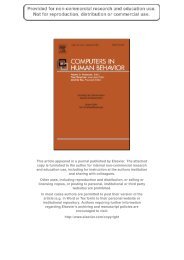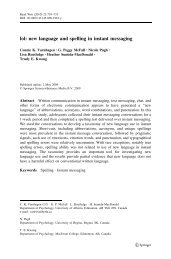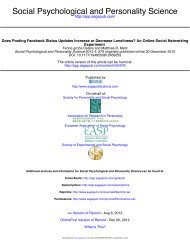Six Models for the Internet + Politics
Create successful ePaper yourself
Turn your PDF publications into a flip-book with our unique Google optimized e-Paper software.
FIG 2. The <strong>Internet</strong> Enhanced Public Sphere<br />
But <strong>the</strong> utility of <strong>the</strong> model <strong>for</strong> our purposes here lies not in capturing or<br />
defending some particular view of democracy, but ra<strong>the</strong>r in laying out <strong>the</strong><br />
general pieces of institutional machinery with which any claim about <strong>the</strong> effect<br />
of technology on politics must account. One difficulty, in our view, with some of<br />
<strong>the</strong> claims about <strong>the</strong> potential benefits of digital technologies <strong>for</strong> democracy is<br />
that <strong>the</strong>y are excessively attentive to <strong>the</strong> novel dynamics that technology enables<br />
but inattentive to <strong>the</strong> institutional dynamics of political systems. We deploy <strong>the</strong><br />
simple schema in Figure 1 above as our way of bringing basic political considerations<br />
back-in.<br />
The Muscular Public Sphere (Model 1)<br />
Digital technologies accelerate <strong>the</strong> flow of communication, and some of <strong>the</strong> first<br />
claims about <strong>the</strong> benefits of <strong>the</strong> <strong>Internet</strong> <strong>for</strong> politics were claims about trans<strong>for</strong>mations<br />
of <strong>the</strong> public sphere. These technologies enable many-to-many communication<br />
(whereas radio and television are one-to-many broadcast technologies),<br />
lower <strong>the</strong> costs of acquiring vast amounts of in<strong>for</strong>mation, and lower <strong>the</strong> costs of<br />
creating and expressing all sorts of views, including political views. 6<br />
The implicit diagnosis is that <strong>the</strong> existing, pre-<strong>Internet</strong>, public sphere is democratically<br />
deficient because it af<strong>for</strong>ds too few speakers and too narrow a range of<br />
messages. Content is controlled by a few large corporate entities, derisively<br />
known as <strong>the</strong> Mainstream Media, or simply “MSM.” From this perspective, <strong>the</strong> <strong>Internet</strong><br />
will improve democracy by making <strong>the</strong> public sphere more accessible and<br />
less concentrated. Increasing accessibility of <strong>the</strong> public sphere on <strong>the</strong> production<br />
and consumption sides means that media content will better reflect <strong>the</strong> considered<br />
and in<strong>for</strong>med views of citizens not least because more citizens participate<br />
in producing those media messages. 7 As ICTs foster interaction among citizens,<br />
new meaning <strong>for</strong>mation is also likely to increase (Singh 2013). Although it is not<br />
often articulated, this view implies that <strong>the</strong> public sphere will exert increasing<br />
<strong>for</strong>ce on political decision making.<br />
The implications of this digital trans<strong>for</strong>mation of <strong>the</strong> public sphere are<br />
depicted in Figure 2 above.<br />
In <strong>the</strong> developed democracies, however, <strong>the</strong> <strong>Internet</strong> does not seem to have<br />
dramatically improved democracy in <strong>the</strong>se ways. The more optimistic predictions<br />
have fallen short <strong>for</strong> several reasons.<br />
6 See e.g., Benkler (2006, pp. 212–272), Shirky (2008).<br />
7 The ef<strong>for</strong>t to relax strict intellectual property limitations is an important component of this approach. See, e.g.,<br />
Sell (2013).<br />
Archon Fung, Hollie Russon Gilman, and Jennifer Shkabatur 33
















